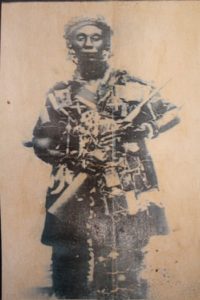
Yaa Asandewaa
*Yaa Asantewaa was born on this date in 1840. She was an African farmer, politician, military leader, and queen mother of Ejisu in the Ashanti Empire, now part of modern-day Ghana.
Born in Besease, in central Ghana, Asantewaa was the older of two children. Her brother, Afrane Panin, became the chief of Edweso, a nearby community. After a childhood without incident, she cultivated crops around Boankra. She entered an adulterous marriage with a man from Kumsi, with whom she had a daughter. During her brother's reign, Asantewaa saw the Ashanti Confederacy go through a series of events that threatened its future, including a civil war from 1883 to 1888.
When her brother died in 1894, Asantewaa used her right as Queen Mother to nominate her own grandson as Ejisuhene. When the British exiled him to Seychelles in 1896, along with the King of Asante Prempeh I and other members of the Asante government, Asantewaa became regent of the Ejisu Juaben district. After the deportation of Prempeh I, the British governor-general of the Gold Coast, Frederick Hodgson, demanded the Golden Stool, the symbol of the Asante nation. This request led to a secret meeting of the remaining members of the Asante government at Kumasi to discuss how to secure the return of their king. There was a disagreement among those present.
Asantewaa, who was at this meeting, stood and addressed the council members with these now-famous words: “Now I have seen that some of you fear to go forward to fight for our king. If it were the brave days of Osei Tutu, Okomfo Anokye, and Opuku Ware I, chiefs would not sit down to see their king taken without firing a shot. No white man could have dared to speak to the Chief of Asante in the way the governor spoke to you chiefs this morning. Is it true that the bravery of Asante is no more? I cannot believe it. It cannot be! I must say this: if you, the men of Asante, will not go forward, then we will. I shall call upon my fellow women. We will fight the white men. We will fight till the last of us falls on the battlefield.”
Several regional Asante kings chose Asantewaa to be the war leader of the Asante fighting force. This is the first and only example of a woman to be given that role in Asante history. Beginning in March 1900, she led the Ashanti War, known as the War of the Golden Stool, against British colonialism. The rebellion laid siege to the fort at Kumasi, where the British had sought refuge. After several months, the Gold Coast governor sent a force of 1,400 to crush the rebellion. During the fighting, Queen Asantewaa and fifteen of her closest advisers were captured, and they, too, were sent into exile to the Seychelles. The rebellion represented the final war in the Anglo-Asante series of wars throughout the 19th century.
On January 1, 1902, the British finally captured the Asante empire and made it part of the British crown. Yaa Asantewaa died in exile in the Seychelles on 17 October 1921. Three years after her death, in 1924, Prempeh I and the other remaining members of the exiled Asante court were allowed to return to Asante. Prempeh I ensured that the remains of Asantewaa and the other exiled Asantes were returned for a proper royal burial. Yaa Asantewaa's dream for an Asante free of British rule was realized on March 6, 1957, when the Asante territory gained independence as part of Ghana, the first African nation in Sub-Saharan Africa to achieve freedom.
The fort still stands today as the Kumasi Fort and Military Museum. In 2000, a week-long centenary celebration was held in Ghana to acknowledge Asantewaa’s accomplishments. As part of these celebrations, a museum was dedicated to her at Kwaso in the Ejisu-Juaben District on August 3, 2000. Unfortunately, a fire on July 23, 2004, destroyed several historical items.